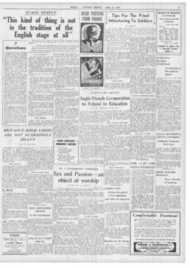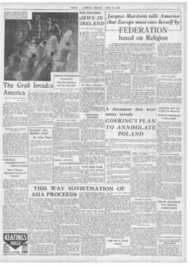Page 6, 12th April 1940
Page 6

Report an error
Noticed an error on this page?If you've noticed an error in this article please click here to report it.
Tags
Share
Related articles
Short Notices
Theology First Things
Religious Books
What Price Catholic Books?
1937 Was A
Of People
BOOKS FOR A BEWILDERED AGE
Eleven, Thank God, By Vincent McNabb, Admiral's Wife. By Cecil Aspinall
O.P. (Sheed and Ward, 2s. 6d.) Oglander. (Longmans, 12s. 6d.)
Landfalls and Windfalls. By W. J. This Way Southward. By A. F.
Blyton. (Murray, 12s. 6d.) Tschiffely. (Heinemann, 15s.)
Still Eastward Bound. By John Lindsay. The Naughty Seymours. By Bernard
(Rich and Cowan. 15s.) Falk. (Hutchinson, 18s.) Reviewed by WIL FRID ROOKE-LEY
HE literature of the Church is rich in lives of saints. But it is not yet rich enough in lives of those average Catholic fathers and mothers who in their own unconscious and unselfish way have given the Ch.urch's rank and file throughout the centuries "— thus Fr. Vincent McNabb by way of preface to Eleven, Thank God.
Average is quite the last adjective T should apply to Fr. 141eNabb's mother, of whom this book is a e t portrait. Whenever anyone asked her how many there were in her family she replied instantly "Eleven, thank God,and her son offers his book " as a challenge to .a bewildered age" which wonders how a woman can thank God for having eleven children. There is nothing to be said about this book except—read it It is a little masterpiece. I might add--domesticate it. But even if you don't, even if you only borrow it for an hour from a library. it is going to leave something in your mind which will haunt you for many a long day.
ANOTHER book that might well have been offered to a bewildered age is Landfalls and Windfalls, by W. J. Blyton.
Mr Blyton spent thirty years of his life in Fleet Street, ending up as a political editor. He has already several books to his credit, on philosophy. literature, foreign affairs, and he writes again in his latest book with the authority which conies from wide reading and varied experience of men and affairs.
We speak of a man reading himself into the Church, and the expression is loose enough; but when Mr Blyton called at Westminster Cathedral clergy house one morning on his way to the editorial chair and asked to see any priest who happened to be disengaged, he was received into the Church within a fortnight; and even that delay seems to have been more a matter of form than of the need of further instruction.
For the past seven years he has been farming in the south of England, and with the help of a very competent son has already managed to reclaim two farms from the jungle in which he found them.
This book is everybody's reading. You say to yourself " the man knows what he is talking about." And he talks about most things under the sun. It is a quiet, personal hook, half narrative, half thinking aloud, as he admits. He has met many of the figures in the European scene; many of the literary giants of the day are his good friends. The note of the book is its sanity.
If I were to single out one topic which is itself one of the most pressing of the hour, and about which he has some of his best things to say, it is the problem of anxiety. Few readers will turn the last pages of this book without feeling that they can in future look worry in the face with a courage founded on reason. Somewhere in the book he talks about St. Paul, for whom his enthusiasm is unbounded, "Do not expect me to be moderate about St. Paul," he cries. I cheerfully borrow his phrase. Do not expect me to be moderate about this wise and wholesome book.
IT is not easy to define the charm of I Mr John Lindsay's Still Eastward Bound, but charm it certainly has. It is the autobiography 'of a very young man, a novelist by trade, who has just joined the army and who thinks very properly that this is the moment to wind up the first chapter of his career with an account of it; and I suppose it is because he has the novelist's eye and is so awake to the little things of life that his book is so enjoyable.
Religion comes in and out of the book. His ambition had been to be a parson. A public school education stirred up his religious emotions violently but sent him out into a cold world with little to protect them. It was a case (there are many such) of " why didst thou promise such a beauteous day and make me travel forth without my cloak! "
I mean no disparagement by saying that he is a natural sentimentalist. Such young men doubly need an anchorage for their religious emotions. What he has retained is a romantic attachment to the Church of England which burns no less brightly for his hesitancy as to a future life. But Mr Lindsay's heart is in the right place; and I hope he will come back from the war safe and sound and perhaps with a sense of Europe which his schooling did little to foster. I wish him the best of luck, ADMIRAL'S WIFE could not have been better timed. It covers the period of the Seven Years War, which found England in as tight a corner as even Hitler could desire for us. Things had come to a pretty pass for one man to cry "I know that I can save the country and I keen' no one else that can." This was Pitt. Boscawen was his favourite admiral; and it was the navy that turned the scale. He was the victor of Louisburg (which gave us Canada) and the national hero of the day. He wore himself out in the service of his country and died at the early age of 49.
Most of his life was spent at sea, and it was during these long absences that his wife wrote him the letters that are collected into this book. It must have been an ideal marriage; and an ideal home-life, nobly sacrificed by each of them on the altar of duty. Mrs Boscawen has been deem-Mod as an English Madame de Sevigne. Certainly her letters are as entertaining as can be, and there is a flash of wit now and then worthy of Horace Walpole. But there is a passion in them that places them in a category of their own. She was entirely wrapped up in her husband and her children. She was " the wife in war-time" of her period; and as such a model for posterity. The ink seems hardly dry on these letters, and they make extraordinarily good reading at the present moment.
TO travel anywhere with Mr Tschiffely I is such a delight that it matters little whether he rides a horse or is carried in a motor-car. Certainly in This Way Southward we are sorry to miss our old friends Gato and Mancha; but this latest journey of his through Patagonia and Terra del Fuego demanded both the car and the aeroplane. It was a journey not without hazards, often of considerable discomfort, and always with excitements.
The land he traversed is little known. Much of it is savage and intimidating. As such it beckoned irresistibly to a traveller like Mr Tschiffely. It was a journey of exploration, and his book therefore has a good deal of historical and geographical value. But as in all his books it is the personality of the traveller that counts, and in this respect his many admirers will in no wise be disappointed.
IT seems as if the Tichborne case is going to intrigue English people until the crack of doom. It is certainly a first-class mystery how Lady Tichborne could so readily have mistaken a creature of such elephantine proportions as Orton, the son of a Wapping butcher, for her son Roger, the svelte ex-guardsman as she must have remembered him.
Mr Bernard Falk in The Naughty Seymours goes deeply into the mystery, and traces it to Lady Tichborne's blood (she was a Seymour) and to the fact that she was French by origin and upbringing. When the claimant with a master-stroke of cunning ended a letter to her "May the blessed Maria have mercy on your soul," thinking this to be the normal flourish to letters between Catholics, the old lady took it in her stride; a mistake which the wife of a Catholic squire would hardly have made if she had been as English as her husband.
Henriette Felicite Seymour, who became Lady Tichborne, is really the principal character in this book, which, for all its rather catch-penny title and its romantic style to suit, is sound history, and when it gets to the great Case, highly entertaining.
blog comments powered by Disqus











